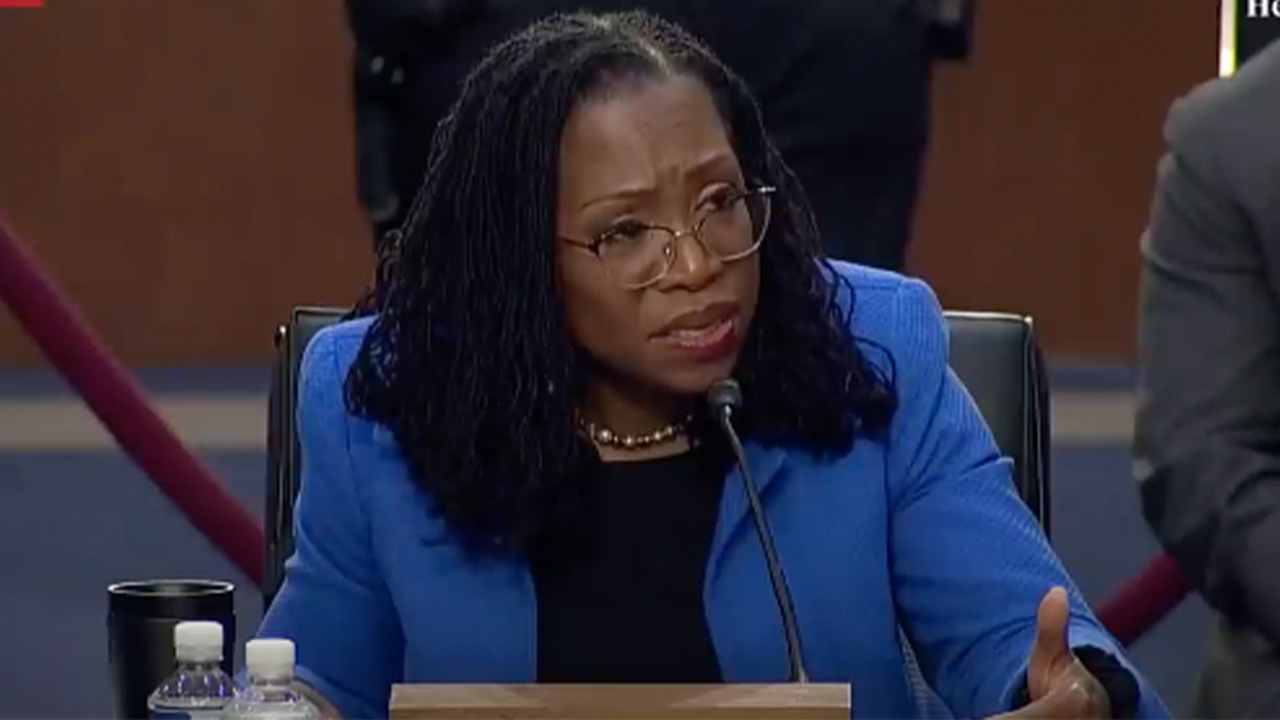


Get a free copy of Parental Rights & Education when you subscribe to our newsletter!

Day 3 of Supreme Court nominee Kentanji Brown Jackson’s confirmation hearings saw conflict not only between Republicans and Jackson, but also between Republicans and Judiciary Committee Chairman Sen. Dick Durbin, D-Ill.
When asked about how she reconciles the Constitution with a world that has changed, such as ensuring First Amendment freedoms in an age of cell phones, Jackson said, “It’s a process of understanding what the core foundational principles are in the Constitution, as captured by the text, as originally intended, and then applying those principles to modern day.”
In an odd moment, Sen. Sheldon Whitehouse, D-R.I., claimed that judicial philosophy was not important and a smokescreen for policy-driven judging.
Jackson noted the value of having different perspectives and dissenting opinions on the Court. “There are actually many justices in history who have used the dissent mechanism to discuss the law in ways that others find over time to be more persuasive,” she said, mentioning Justice John Marshall Harlan, who alone argued against the “separate but equal” decision in Plessy v. Ferguson. “According to Justice Thurgood Marshall, (Harlan’s dissenting opinion) became the blueprint for Justice Marshall to make arguments that led to Brown v. Board of Education. So there is the opportunity for justices to describe their views in ways that become persuasive to others in the future.”
Jackson also promised that, if confirmed, she will recuse herself from a case alleging that Harvard University discriminated against Asian-Americans in its admissions policy, which the Supreme Court is expected to hear in its next term. Jackson not only attended Harvard but currently sits on the school’s Board of Overseers.
Some Republicans continued to press Jackson on her alleged leniency on child porn offenders, as well as other defendants.
Under questioning by Sen. Lindsay Graham, R-S.C., Jackson stated that sentencing guidelines are no longer in step with the times and modes of communication. She noted that the original sentences handed down by Congress for receiving and distributing pornographic materials were based on high volumes that would take a lot more time and effort to mail out or receive than using today’s technology. With the Internet, those sentences are no longer appropriate and too harsh, she said. “With one click, you can receive, you can distribute tens of thousands [of child porn]. You can be doing this for 15 minutes, and all of a sudden, you are looking at 30, 40, 50 years in prison.”
To which Graham interjected: “Good!”
Jackson responded, “Every person in all of these charts and documents, I sent to jail because I know how serious this crime is. Every person, I discussed the harm of these terrible, terrible images to the victims who are portrayed in them. I talked about what this crime does to the children who are being abused in these photos.” She added, “And on the other side of their terms of imprisonment, I ensured that they were facing lengthy periods of supervision and restrictions on their computer use so they could not do this sort of thing again. That’s what Congress has required of judges and that’s what I did in every case.”
Graham replied to her explanation, “Wait a minute, judge, you think it’s a bigger deterrent to take somebody who’s on a computer looking at sexual images of children in the most disgusting way is to supervise their computer habits versus putting them in jail?”
Sen. Hawley, R-Mo., continued to weigh in on the specifics of the different cases in which Jackson gave a shorter sentence than was recommended, including one for which Sen. Ted Cruz was unable to get an answer.
Hawley said, “This is the case where Neil Stewart tried to cross state lines to rape another person’s nine-year-old daughter. He had 6,700 images and videos of egregious and brutal child pornography. The government recommended 97 months. The guidelines recommended 97 to 121 months. You came in at 57 months. Sen. Cruz asked you why. The chairman wouldn’t let you answer. I thought maybe you’d like to answer now.”
She answered: “No one case can stand in for a judge’s entire record. I have sentenced more than 100 people in a variety of egregious circumstances. In every case, and especially cases that involve the kinds of acts that you’re talking about, the kinds of evidence that I had to deal with as a judge, in every case, I am balancing the factors that Congress has determined are appropriate and required for a judge to make a determination. The data points that Sen. Cruz had that you may have in front of you don’t account for all of the information that was before me…I treated those cases and every case very seriously and imposed a sentence that was sufficient but not greater than necessary to promote the purposes of punishment.”
Hawley then asked her, “Would it surprise you to learn Mr. Stewart is a recidivist, with warrants issued for his arrest again just three years after you sentenced him?”
“Would it surprise me?” she asked, seemingly taken aback by the information. “You know Senator, there is data in the Sentencing Commission and elsewhere that there are serious recidivism issues, and so among the various people that I’ve sentenced, I’m not surprised that there are people that re-offend, and it’s a terrible thing that happens in our system.”
Sen. Tom Cotton, R-Ark., also pointed out during his exchange with Jackson that an 18-year-old that Jackson had sentenced to just three months for child pornography had returned to her court again six years later, where she had re-sentenced him to a much harsher sentence. “You know what I think?” Cotton told her. “I think he got caught with child pornography again and wouldn’t have if he had been in prison for the 8 to 10 years that the guidelines called for in 2013 when you first sentenced him.”
Jackson said she couldn’t remember the details of the case. At one point she said, “I’ve said what I’m going to say about these cases,” saying that they give her nightmares.
Sen. Durbin was front and center on Day 3 from his opening statement on. Durbin accused Republican senators of campaigning yesterday and peddling “bizarre conspiracy theories and culture war theories.”
Durbin also refused to release pre-sentencing reports from Jackson’s cases, saying it could endanger victims.
Durbin sparred frequently with Sens. Graham and Cruz, who interrupted Jackson at times, leading to Durbin to interrupt them. At one point Durbin gaveled Cruz, leading to protests from the Republican because Durbin had taken up a minute of his time. Durbin said, “I just want you to play by the rules.”
“I know you like to interrupt, but you’ve consumed a substantial amount of time of my questioning and I’m going to ask my questions and if you want to testify, you’re welcome to,” Cruz said.
After three grueling days in the hot seat, Jackson appeared to get emotional at times, even tearing up and wiping her eyes with a tissue when Sen. Cory Booker, D-N.J., called out Republicans for their questions on her sentencing record, describing it as a “new low.” Booker also sang her praises and appeared to be holding back tears when he told her, “When I look at you — this is why I get emotional — I’m sorry. You’re a person that is so much more than your race and gender. You’re a Christian. You’re a mom. You’re an intellect. You love books. But for me, I’m sorry. It’s hard for me to look at you and not see my mom, not to see my cousins. I see my ancestors and yours. Nobody’s going to steal that joy. You have earned this spot. You are worthy. You are a great American.”
The Jackson confirmation hearings continue tomorrow beginning at 9 a.m. and will include several panels of witnesses testifying on Judge Jackson’s behalf.

